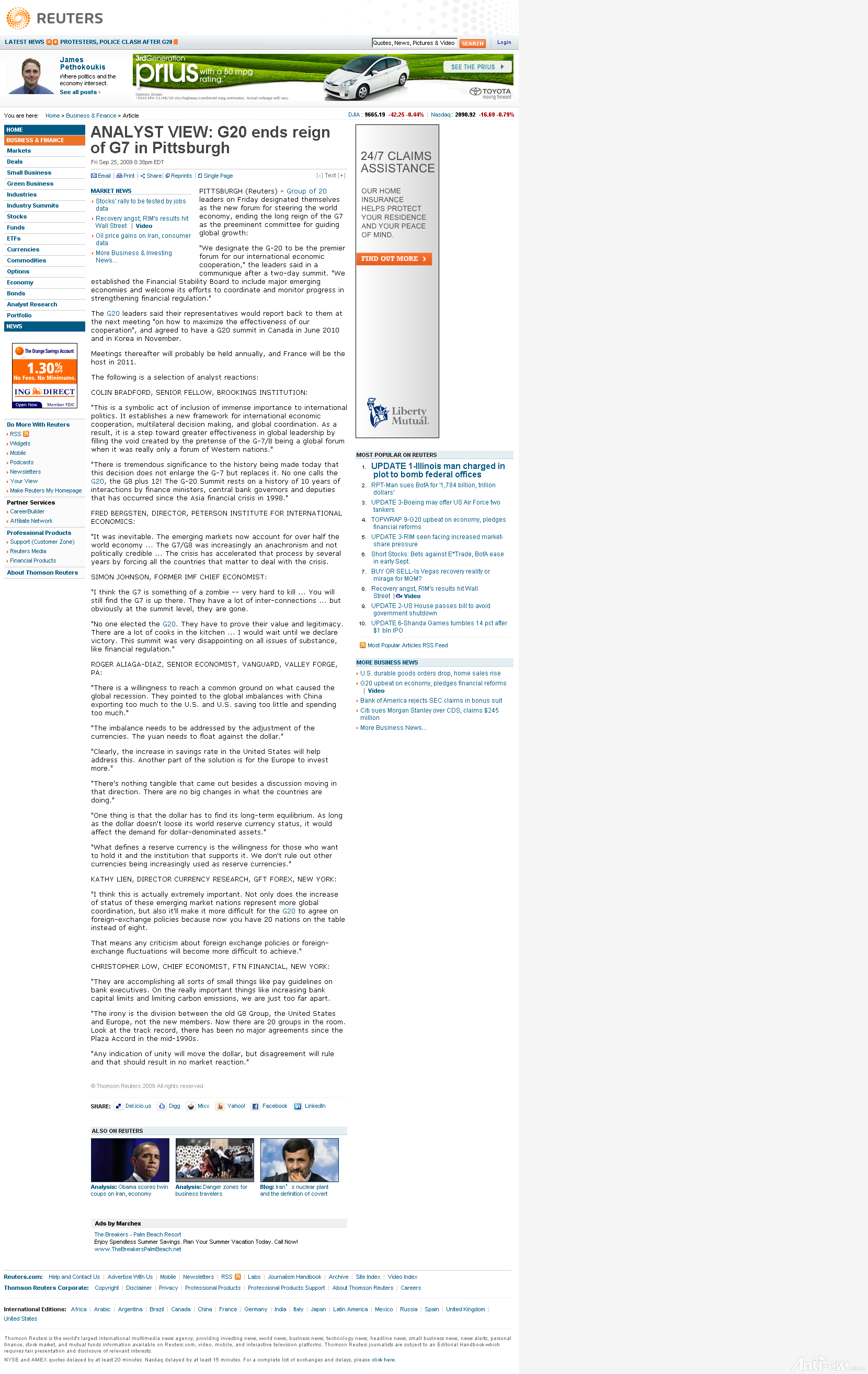|
|
http://www.reuters.com/article/b ... 04Z20090926?sp=true
PITTSBURGH (Reuters) - Group of 20 leaders on Friday designated themselves as the new forum for steering the world economy, ending the long reign of the G7 as the preeminent committee for guiding global growth:
"We designate the G-20 to be the premier forum for our international economic cooperation," the leaders said in a communique after a two-day summit. "We established the Financial Stability Board to include major emerging economies and welcome its efforts to coordinate and monitor progress in strengthening financial regulation."
The G20 leaders said their representatives would report back to them at the next meeting "on how to maximize the effectiveness of our cooperation", and agreed to have a G20 summit in Canada in June 2010 and in Korea in November.
Meetings thereafter will probably be held annually, and France will be the host in 2011.
The following is a selection of analyst reactions:
COLIN BRADFORD, SENIOR FELLOW, BROOKINGS INSTITUTION:
"This is a symbolic act of inclusion of immense importance to international politics. It establishes a new framework for international economic cooperation, multilateral decision making, and global coordination. As a result, it is a step toward greater effectiveness in global leadership by filling the void created by the pretense of the G-7/8 being a global forum when it was really only a forum of Western nations."
"There is tremendous significance to the history being made today that this decision does not enlarge the G-7 but replaces it. No one calls the G20, the G8 plus 12! The G-20 Summit rests on a history of 10 years of interactions by finance ministers, central bank governors and deputies that has occurred since the Asia financial crisis in 1998."
FRED BERGSTEN, DIRECTOR, PETERSON INSTITUTE FOR INTERNATIONAL ECONOMICS:
"It was inevitable. The emerging markets now account for over half the world economy ... The G7/G8 was increasingly an anachronism and not politically credible ... The crisis has accelerated that process by several years by forcing all the countries that matter to deal with the crisis.
SIMON JOHNSON, FORMER IMF CHIEF ECONOMIST:
"I think the G7 is something of a zombie -- very hard to kill ... You will still find the G7 is up there. They have a lot of inter-connections ... but obviously at the summit level, they are gone.
"No one elected the G20. They have to prove their value and legitimacy. There are a lot of cooks in the kitchen ... I would wait until we declare victory. This summit was very disappointing on all issues of substance, like financial regulation."
ROGER ALIAGA-DIAZ, SENIOR ECONOMIST, VANGUARD, VALLEY FORGE, PA:
"There is a willingness to reach a common ground on what caused the global recession. They pointed to the global imbalances with China exporting too much to the U.S. and U.S. saving too little and spending too much."
"The imbalance needs to be addressed by the adjustment of the currencies. The yuan needs to float against the dollar."
"Clearly, the increase in savings rate in the United States will help address this. Another part of the solution is for the Europe to invest more."
"There's nothing tangible that came out besides a discussion moving in that direction. There are no big changes in what the countries are doing."
"One thing is that the dollar has to find its long-term equilibrium. As long as the dollar doesn't loose its world reserve currency status, it would affect the demand for dollar-denominated assets."
"What defines a reserve currency is the willingness for those who want to hold it and the institution that supports it. We don't rule out other currencies being increasingly used as reserve currencies."
KATHY LIEN, DIRECTOR CURRENCY RESEARCH, GFT FOREX, NEW YORK:
"I think this is actually extremely important. Not only does the increase of status of these emerging market nations represent more global coordination, but also it'll make it more difficult for the G20 to agree on foreign-exchange policies because now you have 20 nations on the table instead of eight.
That means any criticism about foreign exchange policies or foreign-exchange fluctuations will become more difficult to achieve."
CHRISTOPHER LOW, CHIEF ECONOMIST, FTN FINANCIAL, NEW YORK:
"They are accomplishing all sorts of small things like pay guidelines on bank executives. On the really important things like increasing bank capital limits and limiting carbon emissions, we are just too far apart.
"The irony is the division between the old G8 Group, the United States and Europe, not the new members. Now there are 20 groups in the room. Look at the track record, there has been no major agreements since the Plaza Accord in the mid-1990s.
"Any indication of unity will move the dollar, but disagreement will rule and that should result in no market reaction."

|
ANALYST, ends, Pittsburgh, reign, view, ANALYST, ends, Pittsburgh, reign, view, ANALYST, ends, Pittsburgh, reign, view
评分
-
1
查看全部评分
-
|